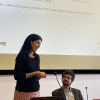A Creative Europe programme grant has been awarded to the Department of Classics and Archaeology within the Faculty of Arts at the University of Malta to conduct the project CITADEL – Classics Through Digital Leisure-Learning. During this project, the University of Malta will be the lead partner with Classics departments from the University of Gdansk (Poland) and the Rijksuniversiteit Groningen (the Netherlands) as well as Weebee Ltd, a Web-development company based in Malta and Spain.
The project’s principal investigator is Dr Carmel Serracino, Senior Lecturer of Classics and Head of the Department of Classics and Archaeology at the University of Malta. The grant amounts to €200,000, and it is the second Creative Europe programme grant to be awarded to the University of Malta as lead partner. Moreover, the project proposal was one of the 177 proposals retained for funding out of the total of 609 submitted proposals in this call.
Project CITADEL aims to revive the interest of young people in Classics and classical literature. This will be achieved through the creation, promotion, and distribution of a digitised game downloadable through a mobile phone app.
The original concept of CITADEL was born from a creative project by a previous Classics student, Ms Skye Vassallo, submitted as part of a study-unit on classical epic. When the project is complete, the game will be cognitively interactive as well as gender-inclusive, while being available in Dutch, English, Maltese, Polish, and Ukrainian. It will simultaneously educate its participants from a literary, historical, creative, cultural, environmental, and economic perspective.
Young students in middle and secondary schools from Malta, Poland, and the Netherlands will attend introductory lectures on Classics in general and workshops on the creation of video games. The students will also have the opportunity to contribute their own ideas to the development of the game, making the game more entertaining, educational, gender-inclusive, eco-friendly, and anti-war. Through this teaching campaign, students will discover how a background in Classics places them in an advantageous position to expand on the knowledge acquired and broaden their career opportunities within the cultural and creative industries.
The Department of Classics and Archaeology thanks the Project Support Office within the Finance Office and Ms Sarah Albanozzo, Research Project Manager at the Research Support Services Directorate, for her invaluable input during the formulation and submission of the project proposal.
For more information and questions on project CITADEL, please contact Andrew Debono Cauchi.
Further information is available online.
The project’s principal investigator is Dr Carmel Serracino, Senior Lecturer of Classics and Head of the Department of Classics and Archaeology at the University of Malta. The grant amounts to €200,000, and it is the second Creative Europe programme grant to be awarded to the University of Malta as lead partner. Moreover, the project proposal was one of the 177 proposals retained for funding out of the total of 609 submitted proposals in this call.
Project CITADEL aims to revive the interest of young people in Classics and classical literature. This will be achieved through the creation, promotion, and distribution of a digitised game downloadable through a mobile phone app.
The original concept of CITADEL was born from a creative project by a previous Classics student, Ms Skye Vassallo, submitted as part of a study-unit on classical epic. When the project is complete, the game will be cognitively interactive as well as gender-inclusive, while being available in Dutch, English, Maltese, Polish, and Ukrainian. It will simultaneously educate its participants from a literary, historical, creative, cultural, environmental, and economic perspective.
Young students in middle and secondary schools from Malta, Poland, and the Netherlands will attend introductory lectures on Classics in general and workshops on the creation of video games. The students will also have the opportunity to contribute their own ideas to the development of the game, making the game more entertaining, educational, gender-inclusive, eco-friendly, and anti-war. Through this teaching campaign, students will discover how a background in Classics places them in an advantageous position to expand on the knowledge acquired and broaden their career opportunities within the cultural and creative industries.
The Department of Classics and Archaeology thanks the Project Support Office within the Finance Office and Ms Sarah Albanozzo, Research Project Manager at the Research Support Services Directorate, for her invaluable input during the formulation and submission of the project proposal.
For more information and questions on project CITADEL, please contact Andrew Debono Cauchi.
Further information is available online.



